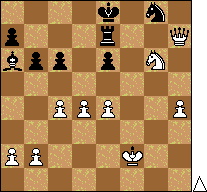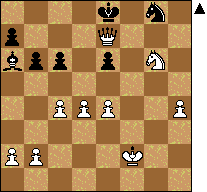The worst chess move I ever played: why did I do that?

As happens periodically, in the chess world recently there was mention of how Wang Hao, one of the top players in the world, in a drawn position slipped into a lost position: his opponent Boris Gelfand made an easy move that forced checkmate the next move. How could such a strong player make such a terrible blunder?
This was hardly the worst move a top chess player has ever made. The fact is, everyone has made even worse errors than this.
Mate in one
Former world champion Vladimir Kramnik has even directly allowed a mate in one:

These kinds of blunders are so terrible that a novice chess player could be expected to find the winning moves.
My not-mate in one
I believe that my worst move ever in a tournament was not missing a mate in one, but playing and announcing a not-mate in one.
In an important tournament game some years ago, I was White against an Expert rated above 2000 and achieved a completely winning position in which my opponent should have resigned long ago: I had been up a Queen for a while, but he just would not resign (he always played that way).
In this position, all I had to do was take his Knight with check, and then take his Rook:

But instead I took the Rook with my Queen and announced checkmate!!

The problem was that it was not checkmate; my opponent calmly took my Queen, I struggled in an ending a piece down, and finally lost (at one point I had actually fought back to a drawn position, miraculously, but the energy drain of having had to continue playing after my blunder caused me to falter).
The reasons for terrible blunders
Computers never make these kinds of mistakes. Only humans do. We tend to make these errors in long games in which we are very low in energy and fall victim to tunnel vision, focusing too much on a certain theme or hypothetical line of continuation, and forgetting the bigger picture. Ironically, it is stronger players who may be most prone to these kinds of errors, because a weaker player with less focus may remain able to see the “simpler” threats rather than get caught up in a long, complex calculation.
Finally, there is the psychological element. I delivered a non-mate because the situation of my opponent continuing to play on while a Queen down disturbed me: I let my feeling of being “insulted” cause me to become impatient and want to “punish” him. I learned a big lesson from that blunder. Now when I see a checkmate, I breathe and double check that it really is a checkmate. For example, in the first round of my current tournament in progress, I delivered a checkmate, because my opponent refused to resign before it happened. I could not help pausing and double-checking that it really was mate.
Conclusion
It is tragicomic when we human chess players make errors that seem incomprehensible out of context. I believe that a large part of successful, consistent chess play is self-knowledge and mastery of one’s mental state.
